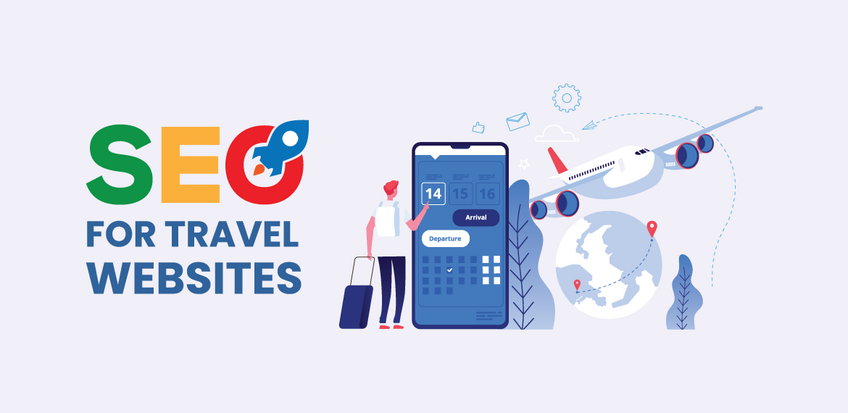SEO Strategies for Travel Agencies: How to Dominate the Search Results

SEO Strategies for Travel Agencies: How to Dominate the Search Results
In the competitive world of travel agencies, ranking high on Google can make or break your business. Search Engine Optimization (SEO) is a critical strategy that can help travel agencies improve their online visibility, attract potential customers, and ultimately drive bookings. In this article, we will dive deep into the best SEO strategies that can propel your travel agency to the top of search engine results pages (SERPs) and give you an edge over your competitors.
Understanding the Importance of SEO for Travel Agencies
Travel agencies heavily rely on online searches to attract customers. Whether they’re looking for vacation packages, flights, hotels, or travel guides, users turn to Google for their travel planning. A high ranking on search engines translates into more traffic, leads, and bookings. Travel SEO focuses on optimizing your website for relevant keywords, improving its usability, and enhancing its authority to ensure your agency is found when people search for travel-related services.
Keyword Research: The Foundation of Travel SEO
Effective keyword research is the bedrock of any successful SEO campaign. For travel agencies, identifying the right keywords is crucial. The goal is to target the terms that potential customers are typing into Google when looking for services you offer. To start, focus on these key types of keywords:
- Transactional Keywords: These are terms that indicate a customer is ready to make a purchase, such as "book flights to Bali," "buy travel packages to Europe," or "cheap hotels in Paris."
- Informational Keywords: These keywords address common questions that users have during the research phase. Examples include "best time to visit Thailand," "things to do in Rome," or "travel tips for solo travelers."
- Local Keywords: Include geo-specific keywords like "travel agency in New York" or "best tours in Barcelona." This is particularly important for agencies that target specific destinations.
Using tools like Google Keyword Planner, Ahrefs, or SEMrush can help identify high-volume and low-competition keywords, which are essential for boosting your travel agency’s visibility.
On-Page SEO: Optimizing Your Travel Agency Website
Once you’ve identified your target keywords, optimizing your website for on-page SEO is the next step. This includes everything from content optimization to user experience enhancements.
1. Title Tags and Meta Descriptions
The title tag is one of the most important on-page SEO elements. Make sure it includes your primary keywords and reflects your page's content. For example, a title like "Best Travel Packages to Europe | Affordable Tours & Vacation Deals" effectively incorporates high-value keywords.
Similarly, your meta descriptions should be concise and include a call to action. These appear in search results and can influence whether users click on your listing.
2. High-Quality Content
Travel agencies must provide informative, engaging, and relevant content to rank well on Google. Write comprehensive guides, travel tips, destination overviews, and customer reviews. Ensure that your content is well-researched and caters to what your target audience is searching for. For example, detailed blog posts about the "Best Travel Destinations in 2024" or "How to Plan a Stress-Free Family Vacation" are both helpful and keyword-rich.
3. Internal Linking
Internal linking helps search engines understand the structure of your website and improves crawlability. Link relevant pages within your site, such as blog posts, destination pages, and service offerings. This strategy helps with SEO and improves the user experience by guiding visitors to other valuable resources on your website.
4. Image Optimization
Images are integral to any travel website, as customers want to visualize the destinations and experiences. Ensure that all images are optimized for SEO by using descriptive filenames and alt text. For example, instead of naming a file “IMG_001.jpg,” name it “beach-resort-Maldives.jpg” to help search engines understand what the image represents. This small step can improve your website’s visibility in Google Image Search, driving more traffic to your site.
5. Mobile Optimization
With the rise of mobile users, having a mobile-friendly website is crucial for any travel agency. Google’s algorithm prioritizes mobile-friendly websites, so ensure your site is responsive, with fast loading times and easy navigation on smaller screens. Mobile optimization enhances user experience, improving your rankings and conversion rates.
Local SEO: Capturing Nearby Travelers
Local SEO is another critical strategy for travel agencies, particularly those that cater to specific regions. By optimizing for local searches, you can attract travelers who are looking for services in your area.
1. Google My Business
Ensure your travel agency has an optimized Google My Business listing. This is essential for local SEO. Include accurate business information, such as your name, address, phone number, and operating hours. Keep your listing updated with images, reviews, and posts about new travel packages or promotions.
2. Local Citations and Backlinks
Create listings in local travel directories, tourism boards, and other industry-specific websites. These citations help build authority and improve your rankings in local searches. Obtaining backlinks from high-authority websites, such as travel blogs, news publications, or even destination websites, can further boost your credibility.
3. Encourage Reviews
Online reviews play a significant role in local SEO rankings. Encourage satisfied customers to leave reviews on Google, TripAdvisor, or other review platforms. Positive reviews can enhance your travel agency’s reputation and improve its visibility in local searches.
Technical SEO: Enhancing Site Performance
In addition to keyword optimization, technical SEO is essential to ensure that search engines can crawl, index, and rank your website efficiently.
1. Website Speed
Slow websites can hurt your rankings. Use tools like Google PageSpeed Insights to analyze and improve your site’s load times. Optimizing images, enabling browser caching, and reducing unnecessary scripts can improve site speed and boost your rankings.
2. Secure Website (HTTPS)
Security is a ranking factor for Google, so make sure your travel agency website uses HTTPS. This improves your SEO and builds trust with visitors, particularly when dealing with sensitive customer data.
3. Structured Data
Adding structured data markup (schema) to your website can improve your search visibility by providing rich snippets in search results. For instance, structured data for reviews, events, and tours can help your travel agency’s listing stand out, attracting more clicks.
Link Building: Building Authority for Your Travel Agency
Backlinks are still one of the most critical ranking factors in SEO. Link building is the process of acquiring hyperlinks from other websites to your own. This can be achieved for travel agencies through partnerships with travel bloggers, influencers, and destination websites.
1. Guest Blogging
One effective way to build backlinks is through guest blogging on authoritative travel blogs. By contributing valuable content to other websites, you get exposure and secure high-quality backlinks to your own site.
2. Collaborations and Partnerships
Form partnerships with local businesses, tour operators, and destination marketers. Collaborating on content or promotions can result in mutual backlinks, driving traffic and improving SEO for both parties.
To thrive in the competitive travel industry, mastering SEO is essential. By focusing on keyword research, on-page optimization, local SEO, technical SEO, and link building, your travel agency can improve its rankings, attract more visitors, and convert them into loyal customers. Implement these SEO strategies today, and watch your agency dominate the search results.







